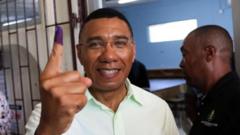How Did Jamaican PM Andrew Holness Secure a Rare Third Term?

Published: 2025-09-04 13:45:12 | Category: world
Jamaican Prime Minister Andrew Holness has secured a historic third term in office following a decisive victory for his Labour Party in the recent elections. With a campaign focused on economic stability and crime reduction, Holness's party won 34 seats compared to the opposition People's National Party's (PNP) 29, marking a significant moment in Jamaica's political landscape.
Last updated: 12 October 2023 (BST)
Key Takeaways
- Andrew Holness's Labour Party won 34 seats in the election, defeating the PNP's 29 seats.
- Holness focused on reducing income tax and maintaining low crime rates.
- The election saw a low voter turnout of 39.5%.
- The opposition raised concerns over government spending and integrity.
- The Organisation of American States commended the calmness of the voting process.
Historic Victory for Holness
Andrew Holness, aged 53, has made history by winning a third consecutive term as Jamaica's Prime Minister. His Labour Party's success in the recent elections, where they secured 34 seats against the PNP's 29, highlights the public's continued support for his leadership. The victory also underscores a significant trend in Jamaican politics, where incumbents often face challenges during elections.
Campaign Promises and Voter Concerns
The recent election was marked by contrasting visions for Jamaica's future. Holness campaigned on a promise to reduce the income tax rate from 25% to 15%, aiming to stimulate economic growth and increase disposable income for citizens. In contrast, PNP leader Mark Golding proposed raising the income tax threshold, reflecting a different approach to fiscal policy.
The Labour Party also capitalised on the falling crime rates in Jamaica, highlighting a murder rate that had reached its lowest point in 25 years. Many voters credited Holness's administration for the improved safety, despite some criticism regarding the controversial measures taken, such as declaring states of emergency in various regions to combat crime.
Economic Achievements and Challenges
At the heart of the election campaign was the economy. The Labour Party pointed to a remarkably low unemployment rate of 3.3% as a testament to its effective governance. This achievement was used to bolster Holness's claims of delivering a stable economic environment conducive to growth and opportunity.
However, the PNP did not shy away from highlighting what they perceived as government mismanagement. They specifically criticised the administration for spending excessively on second-hand school buses, questioning the financial prudence of such decisions. This aspect of the campaign resonated with voters who were concerned about governmental accountability and fiscal responsibility.
Integrity and Accusations
Integrity became a focal point in the election, particularly for Holness. The PNP raised questions about his income and asset declarations, suggesting potential impropriety. In response, Holness firmly denied any wrongdoing, labelling the accusations as distractions intended to divert attention from the government's accomplishments. His rebuttal aimed to reassure voters of his commitment to transparency and good governance.
Voter Turnout and Election Atmosphere
The voter turnout for this election was reported at 39.5%, reflecting a decline in engagement compared to previous elections. Despite this, the Organisation of American States (OAS) observed the electoral process as calm and orderly, commending the electorate's civic maturity and pride in participating in democracy. This observation suggests a significant level of respect for the electoral process among Jamaican citizens, even in the face of lower turnout numbers.
What Lies Ahead for Jamaica
With Holness's victory, the focus now shifts to how his administration will tackle the pressing issues facing Jamaica. The promises of reducing income tax and continuing efforts to maintain low crime rates will be under scrutiny. Additionally, the government will need to address the concerns raised about fiscal responsibility and transparency to maintain public trust.
As the Labour Party prepares to govern for another term, the stakes remain high. The electorate will be watching closely to see whether the government can fulfill its promises and address the issues that matter most to Jamaicans.
Conclusion
Andrew Holness's historic third term presents both opportunities and challenges for Jamaica. As he embarks on this new chapter, questions about economic management, public safety, and governance will be pivotal in shaping the country’s future. How will Holness navigate these challenges while ensuring continued public support? Only time will tell.
FAQs
What are the main campaign promises made by Andrew Holness?
Andrew Holness promised to reduce the income tax rate from 25% to 15% and maintain low crime rates, which he credited as a significant achievement of his administration.
How did the opposition fare in the recent elections?
The opposition People's National Party (PNP) secured 29 seats but conceded defeat to Holness's Labour Party, which won 34 seats in the election.
What was the voter turnout for the election?
The voter turnout for the election was reported at 39.5%, indicating a decrease compared to previous elections.
What were the criticisms directed at Holness's government?
The PNP accused the government of mismanaging funds, particularly regarding the high cost of second-hand school buses, and questioned Holness's integrity over his income and asset declarations.
How did international observers view the election process?
The Organisation of American States (OAS) commended the calm and orderly manner in which the election was conducted, praising the civic maturity of Jamaican voters.



